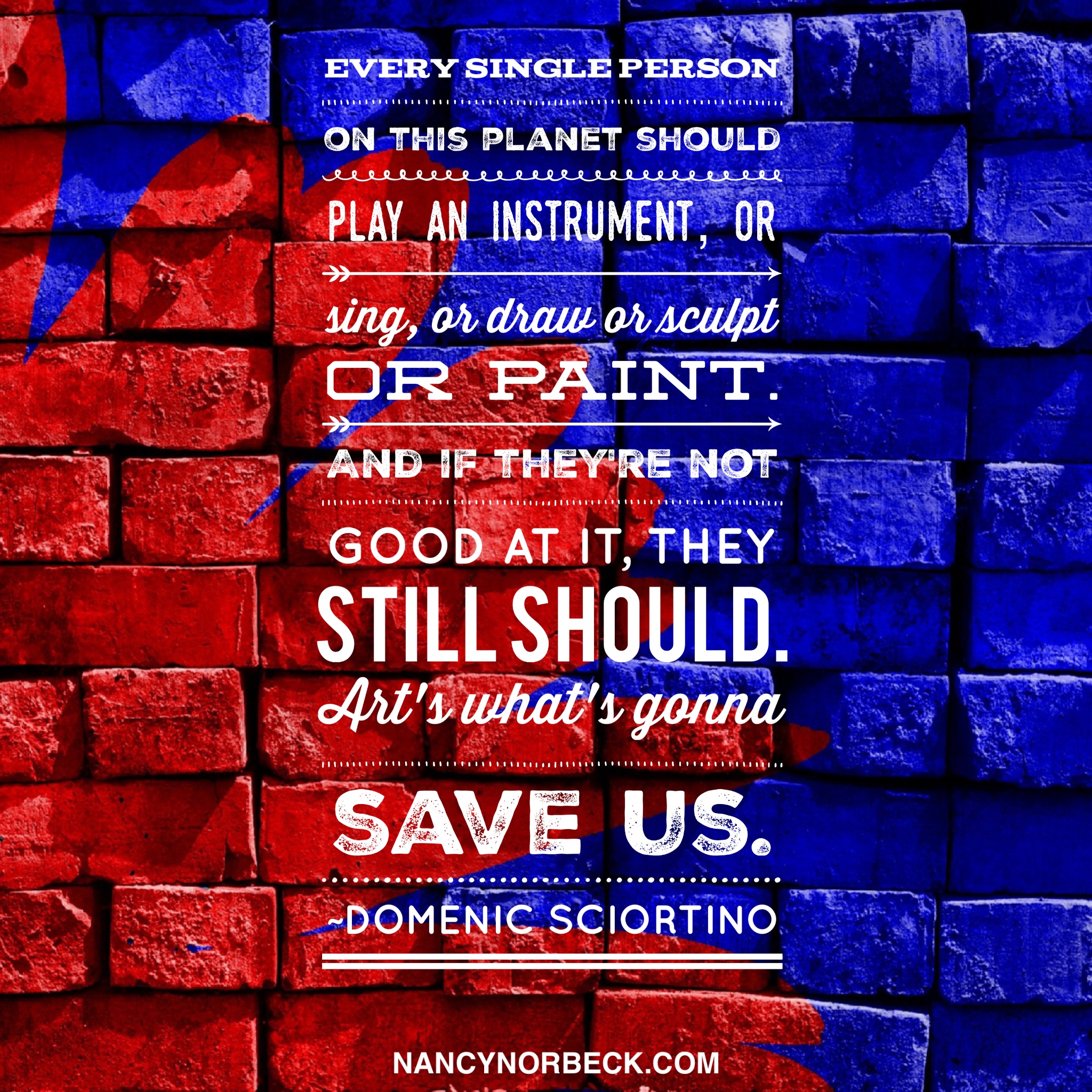My friend Domenic is an interesting guy. I’ve known him since I was a kid, because his dad cut my hair.
When we were in school, Dom drew great cartoons. His dad insisted that he learn to cut hair, which is fabulously practical. I was afraid he’d get distracted from his art.
Fortunately, Dom is one of the most relentlessly creative people I know. These days, it’s music, and he’s not only part of a Beastie Boys tribute band and a few local acts, he recently started doing solo acoustic performances. And here’s the most important part: he agreed to do them even though it scared him.
Dom’s a poster child for creative courage:

How does creative courage, which allows us to create art, save us?
Creative courage gives us permission to play.
While there are many people who will deny it, creativity is not about perfection. In fact, perfectionism is a fantastic way to kill your creative drive.
The thing is, most of us won’t make art at all if we think it has to be perfect. The first thing we do—the sentence we write, the phrase we sing, the stroke we paint—will be up for immediate inspection, and if it’s not as good as we think it should be, we get frustrated, and we stop.
On the other hand, running with the process, with curiosity and playfulness, is like being a kid again, when we’d build things like a Lego boat that was just a jumbled mess of bricks. Ever notice how that “boat,” in the hands of a little kid, not only floats on a non-existent ocean but also contains a tiny, invisible crew? Perfection doesn’t matter, because imagination is in the driver’s seat. Stopping to make that boat seaworthy only derails the process.
Our productivity-driven society tells us only the product is important, but in reality, the process is more important than the product. It brings us joy. Seek perfection later if you must. On the other hand, you might find that your imperfect product is actually just right, which is incredibly liberating, especially when you realize that’s true of you, too.
Creative courage teaches us to believe in ourselves.

We all decide not to do things because we think we can’t do them, or think we’ll make fools of ourselves. But when we do jump off the cliff, it’s usually worth the risk. When I realized that my life was not over if my MFA advisor didn’t absolutely love every single word I wrote (and believe me, she did not), and that she could see the way better than I could, I began to believe in myself. That doesn’t mean that the work was easier. It just means I stopped telling myself I might not be able to do it, and started telling myself I could.
I suspect Dom felt pretty good after his first solo gig. It probably wasn’t perfect, and he might’ve been terrified, but he did it anyway—and people loved it. Then he went back and did another. (He might not stop!)
That’s magical. And when we believe in ourselves, others believe in us, too.
Creative courage is being kind to ourselves.
The easiest thing in the world is ignoring our creativity. When other life pressures come up, creativity tends to be the first thing to go—and yet, we still find time to stare at Facebook or Twitter, because we need a little fun in our lives, right?
Here’s the thing. Time on Facebook is fun, but it’s not fulfilling. It doesn’t feed our souls like singing or drawing or acting does. It doesn’t crawl under our skin and seep into our bones and, when we’re really into it, land us in that flow state where time doesn’t exist and miracles happen.
Isn’t it kinder to give ourselves that experience? Even if we’re scared when we start?
It’s critical to remember how good it feels to let our creativity out to play, and then to spend just five minutes writing, singing, dancing, cooking…whatever brings you joy. We’re most alive—and we have the most fun—when we create.
Here’s the bonus: creative courage creates more of itself. The more you use it, the more you have.
So what are you waiting for? Go create something!
